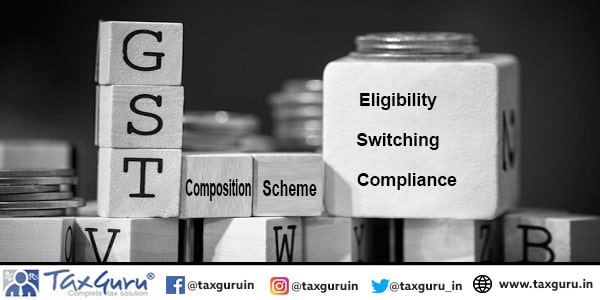Composition Scheme under the GST framework presents a simplified tax regime designed for small manufacturers, traders, and retailers aiming to reduce compliance burdens and tax liabilities. This scheme, as delineated in Section 10 of the Central Goods and Services Tax Act, 2017, allows eligible businesses with an aggregate turnover threshold of up to Rs.75 lakh in special category states and Rs.1.50 crore in other states, to opt for a lower tax rate, diverging from the standard GST rates applicable to regular taxpayers. This facilitative measure not only aids in easing the tax compliance process for small businesses but also in streamlining the taxation structure, making it more accessible and manageable.
Page Contents
(A) Applicability of Composition levy under GST
Composition scheme under GST is applicable for small Manufacturer, Trader and retailer. The persons who are registered under GST but do not want to pay tax at higher rate may pay tax at a lower rate as per the provisions of Sub section (1) of section 10 read with sub-section (2) of the same section of the Central Goods and Services Tax Act, 2017. The same act provides that an eligible registered person, whose aggregate turnover in the preceding financial year did not exceed Rs.75 lakh, in special Category State and 1.50 lakh in other states may opt for composition scheme under GST where they have to pay GST at a lower rate than the rate applied to regular Taxable registered person under GST.

A person opting for composition levy may have to pay tax at regular rate as per nature of service if the value of aggregate turnover in the current financial year crosses Rs.75 lakh/150 lakh as applicable.
For example:
A person is registered under GST in the State of Maharashtra (other than special category state) has opted for composition levy scheme under GST and his turnover in the current financial year on cumulative basis is as follows:
| Month | Cumulative Turnover (Rs. In lakh) |
| April-June | 15 |
| July-September | 35 |
| Oct-December | 85 |
| Jan-March | 155 |
As evident from the above Table that during the first 3 quarters Turnover of the vendor is Rs.85 lakh only i.e. Turnover below 150 lakh so vendor may pay tax at a lower rate. However, during the 4th quarter turnover of the vendor is crossed beyond 150 lakh. Hence the vendor have to pay tax at normal rate as applicable to regular GST registered person.
(B) Switching over
However, It may be noted that a Registered person for composition scheme may opt to switch over to pay tax at regular/normal rate any time during the year upon his turnover limit crossing the threshold limit of Rs.75 lakh for special category states and Rs.150 lakh for other States. But for switching over from regular to composition scheme may only be done at the beginning of the financial year.
(C) Special Category of states under composition levy
Special category of states where threshold of turnover is Rs.75 lakh for composition tax under GST are
1) Arunachal Pradesh
2)Assam
3) Manipur
4) Meghalaya
5) Mizoram
6) Nagaland
7) Sikkim
8) Tripura
9) Himachal Pradesh
(D) Following persons are not eligible for composition scheme:
a) suppliers whose aggregate turnover in the preceding financial year crossed Rs. 75 lakh or 150 lakh as the case may be
b) supplier who has purchased any goods or services from unregistered supplier unless he has paid GST on such goods or services on reverse charge basis;
c) a casual taxable person or a non-resident taxable person;
d) supplier of services, other than restaurant service;
e) persons supplying goods which are not taxable under GST law;
f) persons making any inter-State outward supplies of goods;
g) suppliers making any supply of goods through an electronic commerce operator who is required to collect tax at source under section 52; and
h) manufacturer of special category of items such as:
1) Ice cream and other edible ice whether or not containing cocoa,
2) Pan Masala
3) Tobacco and manufactured tobacco substitutes
(E) Compliance for Registered person under Composition Scheme
Every Composition taxpayer has to furnish a quarterly statement containing the details of payment of self-assessed tax in FORM GST CMP-08, till the 18th day of the month succeeding such quarter. (d) The taxpayer need to furnish a yearly return in FORM GSTR-4, till the 30th day of April following the end of such financial year. A registered person who ceases to satisfy any provision of the scheme has to file an intimation for withdrawal from the scheme in the FORM GST CMP-04, within 7 days of occurrence of such event.
Conclusion: The Composition Scheme under GST serves as a boon for small scale businesses by offering a lower tax rate option, thereby easing the compliance burden and facilitating smoother business operations. While the scheme brings forth benefits such as reduced tax liabilities and simplified compliance requirements, it is bound by eligibility criteria and turnover thresholds that necessitate careful consideration by businesses opting for it. The scheme’s applicability, coupled with the conditions for switching between the regular and composition tax rates, and the exclusions for certain suppliers and goods, underscores the need for businesses to meticulously assess their eligibility and compliance obligations. Ultimately, the Composition Scheme stands as a testament to the GST regime’s commitment to fostering a supportive tax environment for small and medium-sized enterprises (SMEs), aiding in their growth and contributing to the broader economic fabric.





Thanks for your query Nitin
This particular condition is imposed on unregistered supplier who can not raise GST.
b) supplier who has purchased any goods or services from unregistered supplier unless he has paid GST on such goods or services on reverse charge basis
Not eligible for scheme as per your article.
As per my understanding he is required to pay tax in case RCM applicable but it is not a condition.
Correct me in case I am wrong.